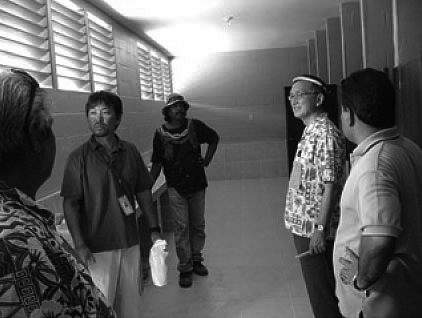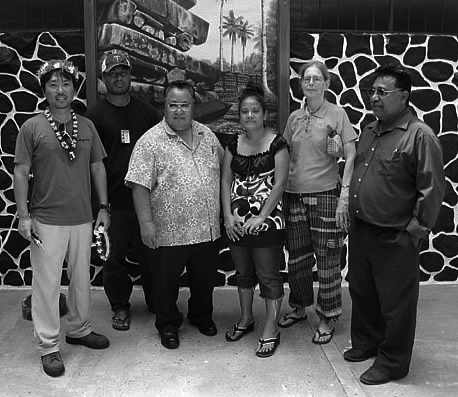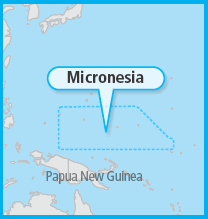Japan's Official Development Assistance White Paper 2009
Column 3 Improvement of Toilets
— Sanitation Improvement Project in Micronesia —
The Federated States of Micronesia s(FSM) is made up of small islands in the Pacific Ocean. For 31 years from 1914 to 1945, these islands were mandated under the League of Nations by Japan's South Seas Bureau.
"Many Japanese words have become part of the local language and are in daily use. One example is 'Mottainai,' which has now become a catch phrase around the world. Flushing toilets is called 'toilets,' but old-fashioned toilets are referred to by the Japanese word for toilet, 'benjo,'" says, Japan Overseas Cooperation Volunteer Mr. Kenji Niwa. Mr. Niwa was dispatched to the Pohnpei State Environmental Protection Agency from 2007 through 2009. He addressed environment problems in Pohnpei through a process of trial and error together with local colleagues and carried out activities such as the planning and implementation of environmental programs for the conservation of nature and improvement of environmental awareness, and producing educational materials on the environment.
One of the initiatives was the improvement of toilets. Toilets in the FSM are generally just a vertical shaft dug in the ground enclosed by zinc roofing, and the sanitary conditions are often not very good.
According to the United Nations Millennium Development Goals Report in 2007, 75% of the population in the FSM does not use sanitary toilets. This situation can lead to the spread of disease among the people, and it threatens the health of children on a day-to-day basis. In the world each day, approximately 4,500 children die of cholera, abdominal typhus, diarrhea, and other illnesses related to dirty water, and there is a need for worldwide efforts in the field of sanitation in regard to toilets and sewage disposal. In 2008, a resolution for the "International Year of Sanitation" submitted by Japan at United Nations was adopted. Japan is proactively carrying out cooperation for the resolution of water and sanitation problems, which are a global issue.
In light of such developments and also encouraged by the Japanese embassy in the FSM, Mr. Niwa and the Pohnpei State Environmental Protection Agency assessed the local sanitation needs, and "The project for the Improvement and Enhancement of Sanitation at 3 schools in Pohnpei," a project in collaboration with Grant Assistance for Grassroots Human Security Projects, was started. When the survey began, it was discovered that the problem of toilets was causing serious consequence not only on the health of children, but also the environment, including contamination of the groundwater, which is essential to the lives of the local people, affecting the surrounding ecosystem. At many schools, the toilet facilities were insufficient taking into consideration the number of students, and they were unisex. The sanitation conditions were so poor that many children did not want to use the toilets. Sometimes fights would break out as the children waited in line. Based on this situation, it was particularly difficult for female students to use the toilets. In response, a toilet project was planned to develop basic infrastructure which is especially needed for school life. In the process of planning, interviews and discussions were set up with the communities, educational personnel, and students, and efforts were made to meet the needs of the local residents and female students in particular. When the toilets were completed, one female student said, "Before it was difficult because we had to use the same toilets as the boys, but now I feel more at ease using the new toilets."
Such grassroots efforts are expected to lead to the improvement of water and sanitation problems threatening the island states and boost awareness regarding gender issues among the local people.

Meeting at site

With the staff of the Pohnpei State Environmental Protection Agency. (Mr. Niwa is on the far left.)

